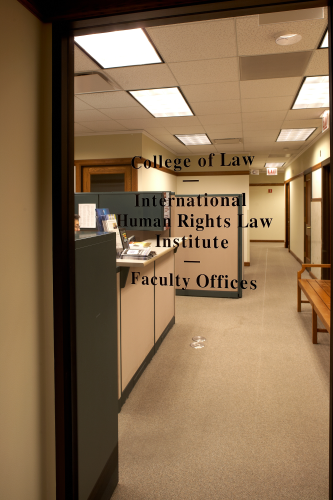Dec 10, 2008
Students at DePaul College of Law Get Hands-On Legal Experience in International Human Rights Law
Students at DePaul College of Law Get Hands-On Legal Experience in International Human Rights Law
Theresa Kleinhaus, a second-year law student, has visions of becoming a human rights attorney when she completes her legal studies. Little did she know that by participating in a fellowship program sponsored by the International Human Rights Law Institute (IHRLI) at the
While in Mexico as part of IHRLI’s Sullivan Fellowship program, which is designed to offer students hands-on experience in providing human rights training, Kleinhaus, 25, and three other students—James Vanzant, Catherine Brady and Rocío Alcantar—joined a legal team working to protect the rights of Mexican human rights advocates who were being threatened for speaking out about abuses they had witnessed.
The fellowship program specifically targets outstanding second- and third-year DePaul students who are interested in human rights law. Becoming legal representatives for actual clients was an added bonus for Kleinhaus and her classmates.
“This is the first case I’ve ever worked on,” said Kleinhaus, a resident of
Their clients are Maurilio Santiago Reyes, president of the Center for Human Rights and Consultancy for Indigenous Peoples (CEDHAPI) in
The students worked with other human rights organizations in the area and quickly filed a petition with the Inter-American Commission on Human Rights, which was created by treaty and signed by all the countries in the
“We take these threats very seriously,” said Daniel Rothenberg, managing director of international projects for IHRLI. “Our students are playing a significant role in working to protect the lives of our Mexican colleagues and to promote the rule of law in
IHRLI, which was established by the DePaul College of Law in 1990, is at the forefront of contemporary human rights research, training and advocacy. It has engaged in human rights training, post-conflict justice programs and large-scale human rights documentation projects throughout the world. It conducts scholarly research on human rights, international criminal law and international humanitarian law. It also works to give students practical legal experience to complement their traditional legal studies.
For Kleinhaus and the other law students, to be able to take such a leading role in an actual case illustrates the type of practical experience that IHRLI strives to bring to legal education at DePaul.
“We are committed to progressing human rights advocacy throughout the world, especially in such areas as the Middle East and

